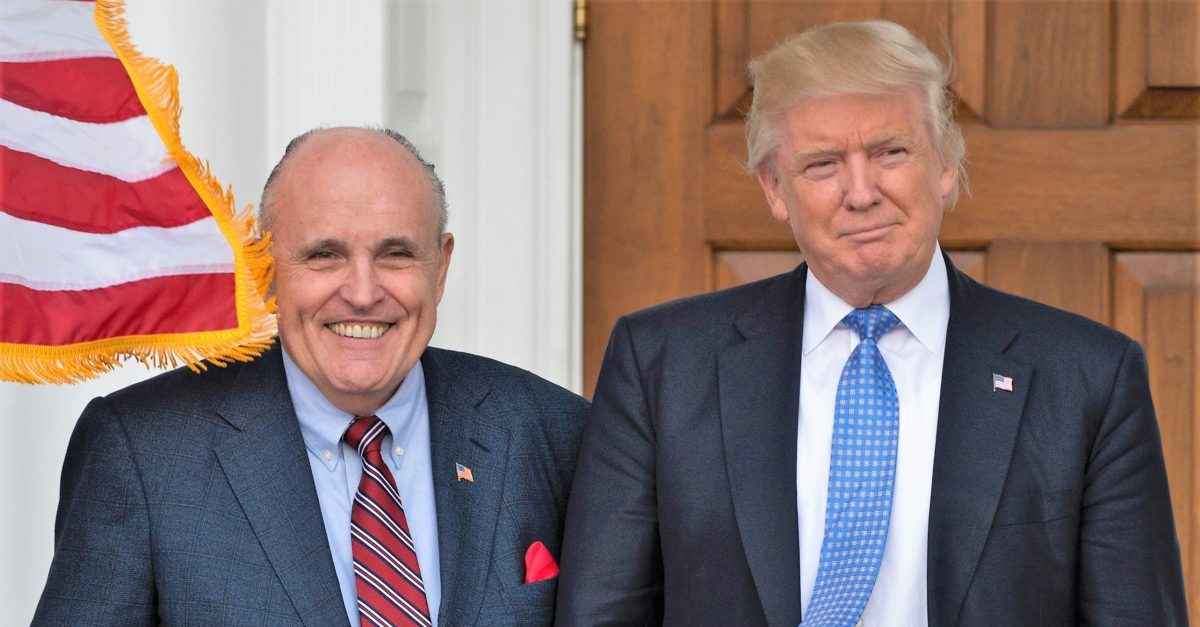
When on ABC’s This Week, Rudy Giuliani was asked about whether President Trump has the power to pardon himself. And in what appears to be a rare moment of clarity, Giuliani got the analysis essentially right. Rudy’s response was that the president, “probably does,” have such power, but added that Trump has “no intention of pardoning himself,” because, “the political ramifications of that would be tough.” Giuliani added, “Pardoning other people is one thing. Pardoning yourself is another.”
Giuliani may have downplayed the result of such a pardon in calling the ramifications simply “tough” – but at least he’s in the general vicinity of correct analysis. Trump might be able to legally accomplish such a move, but the fallout would be too much for his presidency to bear.
This isn’t the first time we’ve examined whether Trump could issue a self-pardon. Last July, news broke that the president had been asking his advisers some specifics about how his pardon power might work if used on his aides, family members and himself. When we analyzed the matter back then, we came to the same conclusion Rudy did – that Trump likely could pardon himself – but that doing so would bring about disastrous consequences.
The president’s pardon power derives from Article II, Section 2 of the United States Constitution, which provides:
“The President … shall have Power to grant Reprieves and Pardons for Offenses against the United States, except in Cases of Impeachment.”
Under Article II, Section 2, the only limits placed on the power are that pardons may only be issued for federal offenses (not civil or state crimes), and a pardon cannot override the Congress’ impeachment power. In the case of Trump, any criminal wrongdoing stemming from the Russia probe would almost certainly be a federal offense, and we’re likely talking about criminal prosecution here – not impeachment. That is, of course, not to say that impeachment couldn’t also happen – but impeachment and prosecution are two entirely separate processes with separate remedies.
Here’s the tricky thing about pardons: They’re not always the final plot twists in a courtroom drama. Sometimes, people are pardoned before they’ve ever been charged with anything. And some pardons have been completely general, just like President Ford’s preemptive pardon of President Nixon for every federal offense Nixon had “committed or may have committed” while in office. A blanket absolution for all offenses that stymies a prosecution before it even happens? That’s got “Trump” written all over it. Ford’s pardon of Nixon wasn’t without its own controversy, as some legal scholars argued that its preemptive nature exceeded the bounds of Ford’s constitutional authority. Others raised the counterargument that that pardons are properly timed so long as they are issued after the commission of a crime – not necessarily after the proof at trial of that crime. Both arguments make some sense, and neither has been tested, so it’s tough to say what would happen if the issue were raised in court by the Trump administration or its opponents.
The idea of a self-pardon is definitely something new for Americans. No president has ever pardoned himself — not even Nixon, who knew a prosecution was looming. Because it’s never been attempted, the legal battles haven’t yet been waged. Most likely, a Trump self-pardon would spark a battle between those who believe it’s legal, simply because it’s not specifically forbidden in the Constitution – and those who believe it’s illegal, because it offends traditional legal sensibilities. After all, our legal system doesn’t, under any other circumstance, allow a person to preside over his own fate when he has been accused of a crime.
Former U.S. Attorney for the S.D.N.Y. Preet Bharara is one such skeptic, who wasn’t quite as convinced as was his predecessor on the president’s authority to issue a self-pardon. Bharara told CNN:
I think (if) the President decided he was going to pardon himself, I think that’s almost self-executing impeachment. Whether or not there is a minor legal argument that some law professor somewhere in a legal journal can make that the President can pardon, that’s not what the framers could have intended. That’s not what the American people, I think, would be able to stand for.
While Giuliani might not be comfortable explicitly naming impeachment as a certain consequence of a presidential self-pardon, he appears to at least have some inkling that it would be bad for Trump. Such a move, although perhaps technically legal, would likely stretch executive authority far past the bounds Congress would tolerate.
[Image via DON EMMERT/AFP/Getty Images.]
This is an opinion piece. The views expressed in this article are those of just the author.